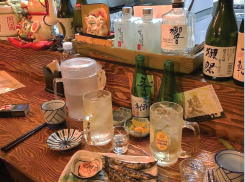Having Peace Will Bring You Happiness
Yoon Ji-in Reporter
Have you ever heard of ‘sohwakhaeng(小確幸)’, meaning small but certain happiness in Korean? It originates from ‘Afternoon in the Islets of Langerhans’ by Japanese author, Murakami Haruki. There are some daily experiences in it, that provide happiness in life such as seeing neat underwear in a drawer and eating freshly baked bread with (person’s name) hands. When this term first emerged, it didn’t get special interest from readers. However, after more than 30 years, the concept of ‘small but certain happiness’ is being used once again in Korea. Moreover, nowadays, ‘sohwakhaeng’ has been installed as a widely and frequently used term, even skipping its meaning or source. In light of this, we can that Korean society has been more caring about wellbeing.

Similar Meaning with ‘Sohwakhaeng’

As mentioned, in Korea, there is a ‘sohwakhaeng’. Is it the only case of having a term related to happiness? What about other countries?

Lagom
‘Lagom’ is a Swedish expression that means 'balance', caring about suitable life. It puts emphasis on celebrating little achievements in life, having the right feeling of now. Also, ‘lagom’ has the goal of creating a balanced living and feeling content with what we have and getting along with the community and the environment.
Hygge
‘Hygge’ is a Norwegian word which means a mood of happy coziness with family or friends. It is a lifestyle enjoying and cherishing the time you spend with your loved ones. This is one of the secrets of the world-class happiness of Denmark.

‘Sohwakhaeng’, ‘lagom’ and ‘hygge’ all have different meanings but have a common philosophy of being satisfied with the now and finding happiness in one’s own life.

You could meet infinite happiness regardless of achievement or evaluation by conducting ‘sohwakhaeng’. Its standard is on oneself, not on society or others. In this sense, it has a meaning that people have been finding their happiness beyond standardized patterns unlike the past where entering a good university or getting a good career was considered the highest value of one’s life.

Here is an example of a man with ‘sohwakhaeng’. Let’s listen to his story.
Interview with a Student from CBNU
Could you say hello to the readers of the CBNU GLOBE?
Hello, I am a student, attending my last semester at CBNU.
How are you doing? Is everything alright?
Yes, but actually, I think I am over the general age of graduation from the university. Therefore, there are a lot of stressful situations to deal with in my life, but what worries me the most is my future. I'd like to express the stress I get from my relationship with (my girlfriend?) is nothing compared to my future. Focusing on myself and my future on top of everything else is a struggle.

I'm sorry to hear that. But maybe many other students are also having the same problems as you. Could you share your ways to release that kind of stress?
Watching movies or dramas with snacks in my leisure time is absolutely the best way to make me feel better. Also, I enjoy drinking. I like alcohol, but what I like more than that is the ambience of being with friends and spending time with valuable people. The third thing I like to dois listen to music. F to music, I've discovered unknown but good musicis cathartic for me. Music is a thing that consistently stirsdramatic emotions in. Three ways I havementioned toare not special things, but they make me happy and give me energy in my daily life.
As you can see from this interview, ‘sohwakheng’ can give us a way to get from stress. However, this ‘sohwakheng’ trend is not always good. There are many reasons is. First, it’s not good to checkwhether one is happy or not. You mayincrease stress you obsessing overhappiness. Second, the society would turn into an atmosphere of despair, throwing oneself out of real life and neglecting their ambitions due to the fact that they are focused solely on minor things that they think will lead tohappiness. The final point I want to make is people tend to spend their time recklessly with the intention of being happy. For example, people go abroad without considering their economic situation first.
So how can we find a healthy balance of happiness? Above all things, you should not to push yourself to achievehappiness. If you concentrate on happiness too much, you may never reach it. Also, do not adjust to others' ways of being happy. Next, you should not impulse in an attempt to fill the emptiness you may feel. Instead, ask yourself ‘W values do I want to pursue in my life?', and try to think about that. If you find the answer, you could organize your mind and set a direction foryour life. That will help you to reach a balance between your efforts and pleasure. As the saying goes, “The secret of happiness is not in doing what one likes, but in liking what one does.” Try to find away to be satisfied with now, but not to be perfect. You are valuable and already perfect the way you are. If you can suggestions, your life may be full of small but real moments of happiness.

